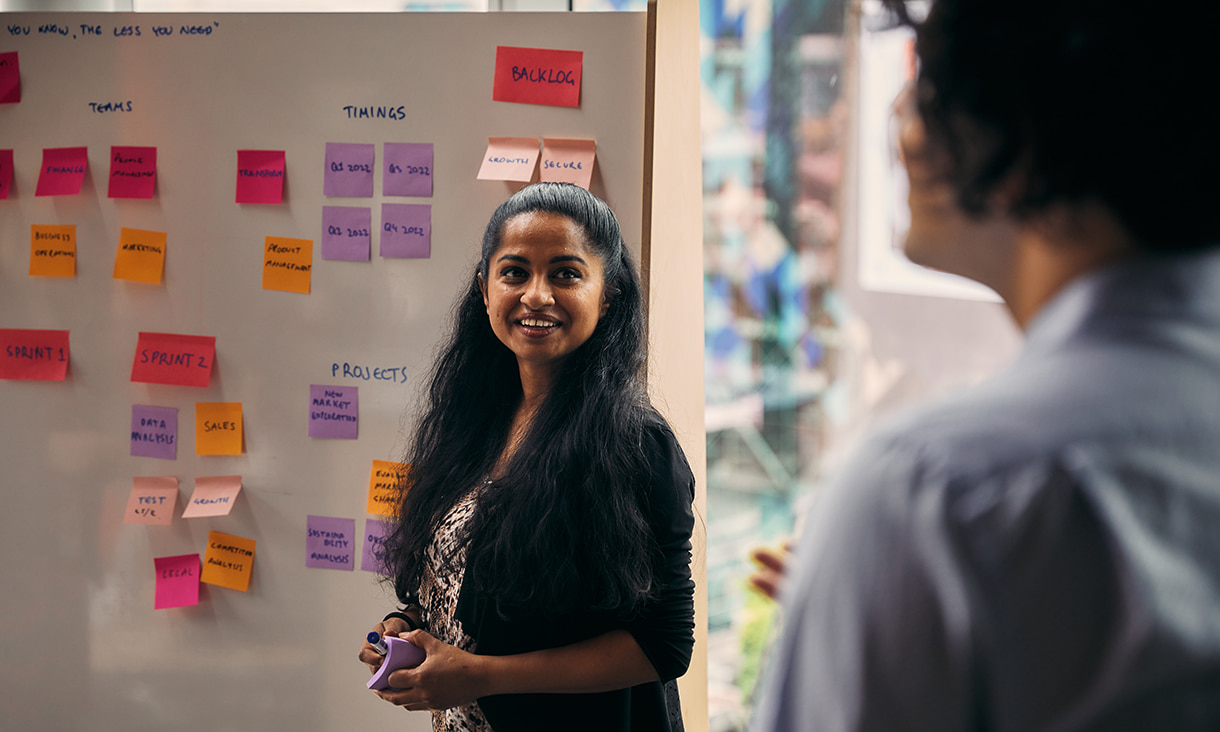Here are some questions to lead you to the RMIT Bachelor of Business – a course that’s industry-focused, globally relevant and suited to your unique skillset.
From human resources to marketing and commerce, the types of business courses available are vast and varied. That’s partly because the career paths in business are equally as dynamic and diverse – but how do you find one you love?
The RMIT Bachelor of Business is a business course that’s industry-focused, globally relevant and suited to your unique skillset.
Here are some questions to ask yourself that prove the RMIT Bachelor of Business is the right study choice for you.

#1: What are the current and forecasted trends in business?
Knowing what’s impacting the business world today is crucial in understanding what could shape it tomorrow. Some of the fastest-growing technologies and in-demand skillsets in business include:
Blockchain: A survey by Deloitte found that 55% of senior executives and practitioners in global organisations viewed blockchain as “critical” and in the “top five strategic priorities” between 2020 and 2022.1
Artificial intelligence: Global revenue in AI is expected to grow by 13.2% annually until 2024, including an estimated US$29 billion growth in revenue in the Asia-Pacific region. As a result of these coming trends, experts estimate that Australia’s AI specialist workforce will need up to 161,000 workers by 2030.2
Data analytics: “There’s an increasing demand for people who don’t just have the technical skill to understand the data, but the ability to ask what the data means and communicate it,” says James Harland, Associate Dean of Student Experience and Professor in Computational Logic at RMIT.
Due to high demand for specialised and hybrid skills and knowledge, roles are also emerging in areas such as nanotechnology, digitalisation, and the green and circular economies.
Through RMIT’s Bachelor of Business, you’ll build job-ready experience in responding to these business trends. With majors and minors in areas like blockchain, digital supply chains, and law and emerging technology, you'll graduate with the experience to lead tomorrow’s business transformations.
#2: Does the business course give you flexibility to explore your interests?
Perhaps you’re interested in a variety of business specialisations and you’re still trying to work out which one is right for you, or maybe you’re not quite sure where to start.
But what if there was a way to build your own business course as you experience it?
RMIT's Bachelor of Business makes this idea a reality. Choose from 15 majors that will help shape your study experience and select from 35 minors that will complement them. Majors and minors will develop your business acumen in industry-relevant areas, giving you the opportunity to further specialise or diversify your skillset.
In the business course, you have full flexibility to choose to do two majors, one major or none at all, and you can shift your study focus as your interests change over time.
#3: Which transferrable skills could help you adapt to anything?
Head of Teaching and Learning at RMIT’s College of Business and Law, Associate Professor Jonathan Boymal, said the future of work will look very different.
“One out of every ten workers is likely to look for a new occupation by 2030, and COVID-19 has really accelerated this,” he said.
“What we’re seeing is that there’s a need to combine majors and minors because many mature occupations have been transformed by megatrends in digitalisation, automation and artificial intelligence.
“What we’re seeing the growth of is what we can refer to as the ‘hybrid occupation’.”
The flexible structure of the Bachelor of Business at RMIT prepares you for tomorrow's hybrid business roles. By combining majors and minors, you’ll gain skills that are transferrable throughout many areas of business, including:
Managing global and remote teams
Socially responsible business
Technology transformation for small to medium enterprises
Business analytics and technology
#4: What kind of practical experience could you gain from the business course?
Work Integrated Learning, industry connections and practical experience are what set business graduates apart. These opportunities help you gain experience for your résumé, and they build your confidence to apply classroom theories in real-world scenarios.
Industry engagement is core to your development in the Bachelor of Business. You’ll connect with future employers such as Adobe, Medibank, KPMG and Australia Post by working alongside them in workshops, internships and projects. The Bachelor of Business (Professional Practice) also features an additional year of industry engagement, including an award-winning virtual internship with the Impact Academy.
#5: Will the business course help you get a job now and sustain it in the future?
Gaining transferrable skills, staying ahead of industry megatrends and gaining practical experience are all good ways to ensure future job stability in a world where demand for hybrid roles is growing.
RMIT’s Bachelor of Business will prepare you for a wide range of careers, including jobs that are growing or yet to be defined.
As a graduate, you will have the skills and capabilities to make decisions, lead change and innovate in diverse professional environments. You will also have excellent industry connections and a digital portfolio of real-world outcomes that have been developed throughout your studies.
Experience the industry, gain the real-world edge and rewrite what’s next in business at RMIT.
Story: Pallavi Daniel
1Pawczuk, Linda, et al. Deloitte's 2021 Global Blockchain Survey: A new age of digital assets. Deloitte Insights, 2021.
2ACS Australia’s Digital Pulse. ACS, Deloitte, 2021.

